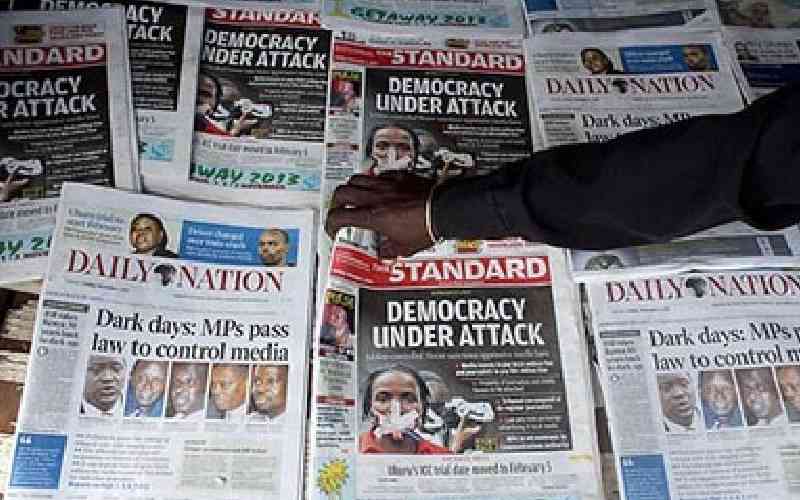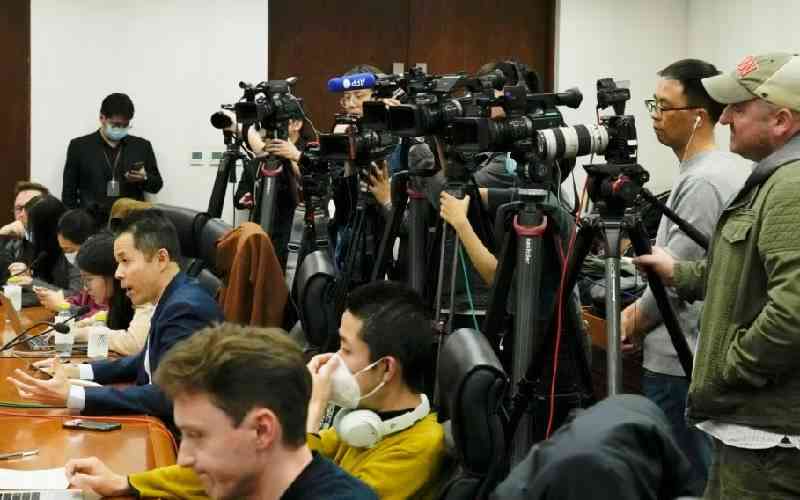By ALPHONCE SHIUNDU
Nairobi, Kenya: Free speech and democracy was attacked in the National Assembly Thursday evening when MPs approved to have a government-appointed tribunal to slap punitive fines on journalists and media houses.
They have imposed a Sh20 million maximum fine for all media houses that breach the code of conduct and Sh1 million for journalists who breach the code of conduct. The tribunal has sweeping powers to even attach property of journalists and media houses, just to get the money.
The MPs have also slapped a cap on how media houses will make their money, as they put a limit on the foreign advertising in local media –a move that will cripple news gathering, and cut the money used to ensure Kenyans get informed.
If looked at in the context of the stories about the Westgate looting by the military which were aired by KTN and which the government’s official line was to deny and intimidate the media and journalists, the new proposals give the government immense control over the tribunal, given that all the members will be picked by selection panel formed by the Cabinet Secretary.
Only 28 MPs including Majority Leader Aden Duale and Deputy Minority Leader Jakoyo Midiwo, were in the House, when they approved the amendments to the Kenya Information and Communications (amendment) Bill, 2013 at committee stage of the whole House presided over by the Deputy Speaker Joyce Laboso at 4.35pm.
Speaker Justin Muturi was in the seat when the House agreed with what the handful of the MPs had done at 4.55pm. When the mace was replaced in the number of MPs in the House was 28.
The quorum for the House is 50 MPs. The only problem is that the Speaker or whoever is presiding over business is blind to quorum until they’re notified of the lack of quorum. It is unclear whether the quorum at the committee stage should be 50MPs, because, at that time, the mace is usually removed.
But the House rules and the Constitution are very clear that any Bill approved without quorum is invalid ab initio.
When the matter came for the Third Reading, Kamau then walked out and called more MPs to the House. More were coming in to debate the Public Investments Committee report on the contract between National Cereals and Produce Board and the Erad Supplies and General Contracts.
Even the Majority Leader complained that the numbers in the House were inadequate: “This is a very good though controversial Bill but members are not here. This house should have been more full when this Bill is passed.”
When Muturi put the matter to vote at 5.08pm, there were over 60 MPs in the House. They all unanimously voted ‘aye’ to send the Bill, with the offending amendments, to President Uhuru Kenyatta for assent.
Besides, MPs have taken control of the airwaves with the approval of controversial last-minute amendments to the Kenya Information and Communications (amendment) Bill, 2013.
They denied the Cabinet Secretary the power to pick members of the Communications Authority of Kenya, and instead said that was the domain of MPs. They said MPs will vet all nominees to the authority.
The lawmakers also want the government to decide what the public will see and when they will see it. They said half of what Kenyans will see in daytime will be local content.
Stay informed. Subscribe to our newsletter
“A broadcaster licensed to distribute Radio and TV programme services shall make sure that 45 per cent of programmes and advertisements broadcast on TV and radio on any given day comprise local content,” said Nicholas Gumbo (Rarieda).
The MP said that media houses will have 18 months to terminate advertising contracts from foreign firms to meet the prescribed quota. His colleagues agreed with him and approved the amendment. That will cripple the news business and affect what the public will get to see.
The chairman of the House Committee on Communication and Energy, Jamleck Kamau (Kigumo), backed the amendments and told his colleagues in the House that the amendments had been agreed by all the industry players.
The punitive fines will be imposed by a five-member tribunal strictly appointed by a team appointed by the Cabinet Secretary in charge of Information and Communication, Dr Fred Matiang’i. The tribunal will also have powers to de-register journalists.
On the face of it, the MPs argued that by creating the Communications and Multimedia Appeals Tribunal, they were trying to guarantee the independence of the body from the industry players.
But they have given the body the power to adjudicate on complaints by “any person” in stories carried in the newspapers, the conduct of journalists, and other matters that are likely to hinder the practice of journalism as hitherto practiced.
They gave the tribunal sweeping powers to “make any supplementary or ancillary orders or directions that it may consider necessary for carrying into effect orders or directives”.
Johnson Sakaja (nominated) moved the amendment on having a quota for local content: “ Once this quota is there, the media houses will invest so that at the end of the day, we make sure that we have quality in the production of local content.”
 The Standard Group Plc is a
multi-media organization with investments in media platforms spanning newspaper
print operations, television, radio broadcasting, digital and online services. The
Standard Group is recognized as a leading multi-media house in Kenya with a key
influence in matters of national and international interest.
The Standard Group Plc is a
multi-media organization with investments in media platforms spanning newspaper
print operations, television, radio broadcasting, digital and online services. The
Standard Group is recognized as a leading multi-media house in Kenya with a key
influence in matters of national and international interest.
 The Standard Group Plc is a
multi-media organization with investments in media platforms spanning newspaper
print operations, television, radio broadcasting, digital and online services. The
Standard Group is recognized as a leading multi-media house in Kenya with a key
influence in matters of national and international interest.
The Standard Group Plc is a
multi-media organization with investments in media platforms spanning newspaper
print operations, television, radio broadcasting, digital and online services. The
Standard Group is recognized as a leading multi-media house in Kenya with a key
influence in matters of national and international interest.








